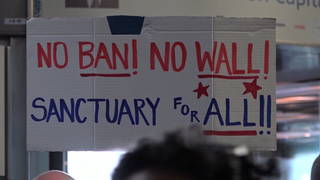
Courts have temporarily blocked President Trump’s executive order banning people from seven majority-Muslim nations from entering the United States. Early this morning, lawyers for the states of Washington and Minnesota filed a brief with a panel of the Ninth Circuit Court of Appeals arguing against restoring Trump’s executive order banning people from Iraq, Syria, Iran, Sudan, Libya, Somalia and Yemen from entering the United States, saying that to reinstate the ban would “unleash chaos again.” On Sunday, a California appeals court sided with a lower court in Seattle and refused to reinstate the travel ban. The Seattle ruling, issued by U.S. District Court Judge James Robart on Friday, imposed a nationwide temporary restraining order on the ban. Over the weekend, the Department of Homeland Security began allowing visa holders affected by Trump’s order to board U.S.-bound flights. On Sunday, Roslyn Sinha, an Iraqi passport holder with a valid visa to live in the United States, was among those who was able to return.
Transcript
JUAN GONZÁLEZ: Just two weeks into his presidency, Donald Trump is locked in a battle with the federal courts over his executive order that bans refugees and travelers from seven predominantly Muslim countries from entering the United States. Early this morning, lawyers for the states of Washington and Minnesota filed a brief with a three-judge panel of the Ninth Circuit Court of Appeals that argued restoring Trump’s ban for Iraq, Syria, Iran, Sudan, Libya, Somalia and Yemen would, quote, “unleash chaos again.” This comes after the lawyers say as many as 100,000 people from the banned countries had their visas canceled.
Trump’s executive order is based on a legal claim of national security, but lawyers argue that the order is unconstitutional and hurts residents, businesses and universities. Technology companies, such as Apple and Google, submitted accompanying briefs that say the ban would damage their business by make it harder to recruit new workers. Since 9/11, no fatal attacks have been committed by people from the countries restricted by Trump’s travel ban.
Lawyers for the Justice Department have until 6:00 p.m. tonight to file their responses with the Ninth Circuit. This comes after, on Sunday, a California appeals court sided with a lower court in Seattle and refused to reinstate the ban. The Seattle ruling, issued by U.S. District Judge James Robart on Friday, imposed a nationwide temporary restraining order on the ban. This is Judge Robart.
JUDGE JAMES ROBART: The court concludes that the circumstances that brought it here today are such that we must intervene to fulfill the judiciary’s constitutional role in our tri-part government. Therefore, the court concludes that entry of the above-described TRO is necessary, and the state’s motion is hereby granted.
AMY GOODMAN: Judge Robart’s ruling prompted a Twitter rant from President Trump that began Saturday and continued throughout the weekend. The president wrote, quote, “The opinion of this so-called judge, which essentially takes law-enforcement away from our country, is ridiculous and will be overturned!” Trump tweeted, “Bad people are very happy!” And “Just cannot believe a judge would put our country in such peril. If something happens blame him and court system. People pouring in. Bad!” Trump tweeted.
On Sunday, Vice President Mike Pence appeared on all four TV network talk shows to defend the ban. He spoke on ABC’s This Week, CBS’ Face the Nation, Fox News Sunday and on NBC’s Meet the Press with Chuck Todd, where he was asked about Trump’s reference to the “so-called judge” who ordered a stay of the order.
VICE PRESIDENT MIKE PENCE: The president of the United States has every right to criticize the other two branches of government, and we have a long tradition of that in this country. But I think—I think—
CHUCK TODD: Is this a constructive way to do it?
VICE PRESIDENT MIKE PENCE: I think people find it very refreshing that they not only understand this president’s mind, but they understand how he feels about things. He expresses himself in a unique way.
JUAN GONZÁLEZ: Over the weekend, the Homeland Security Department began allowing visa holders affected by Trump’s order to board U.S.-bound flights. The agency said it had, quote, “suspended any and all actions” related to the travel ban.
On Sunday, an Iraqi passport holder with a valid visa to live in the United States returned to the U.S. after a tumultuous few days. Roslyn Sinha landed at Dulles International Airport outside Washington, expressing relief that her ordeal was over.
ROSLYN SINHA: As I was in the air, Donald Trump signed the executive order. That made all of us confused. The airlines couldn’t let me on board. The embassy couldn’t help us. Being banned over my parents’ heritage was an unfair treatment. It’s just—but when you see the activists, the lawyers, the people who were protesting to get us back home, you think that this country will always be great, no matter what.
AMY GOODMAN: When we come back from break, we’ll go to Seattle, Washington, where we’ll be joined by Matt Adams, lead attorney for a class action lawsuit filed there that challenges the Trump administration’s Muslim ban. We’ll be back in a minute.
[break]
AMY GOODMAN: A performance of Stevie Wonder’s “Higher Ground” at the LGBTQ rally at Stonewall Inn on Saturday. Thousands were protesting Donald Trump. We’ll go to that rally later in the broadcast. This is Democracy Now!, democracynow.org, The War and Peace Report. I’m Amy Goodman, with Juan González.













Media Options